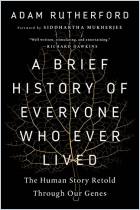Melden Sie sich bei getAbstract an, um die Zusammenfassung zu erhalten.

Melden Sie sich bei getAbstract an, um die Zusammenfassung zu erhalten.
J. Craig Venter
A Life Decoded
My Genome: My Life
Viking, 2007
Was ist drin?
More than anyone else on the planet, Craig Venter possesses ultimate self-knowledge, right down to his own DNA.
Recommendation
J. Craig Venter claims to be one of the “leading scientists of the 21st century” – and he is right. Venter is a brilliant visionary and pioneer in genomic research. He was first to decode the full DNA of a living organism, the bacterium Haemophilus influenzae. Subsequently, Venter moved up significantly in scientific class by completing the DNA sequence of the human genome. Feverishly ambitious, he is now researching ocean genomes in hopes of finding new fuel sources and of becoming the first scientist to create artificial life. Venter does nothing by halves, hence his designation by Time magazine as one of the world’s 100 most influential people. Yet, in scientific circles, he has also earned some disdain as an egotistical “wild man of biotech.” Many scientists see his use of his own DNA in the human genome project as a shocking lack of scientific decorum. He comes across, in his own words, as narcissistic. This self-absorption, and his pervasive portrayal of himself as an altruistic purist constantly battling bureaucratic philistines, interferes with his story about how he cracked the human genome code. Clearly, it’s not easy being a genius, but it sure is interesting, and so getAbstract recommends Venter’s account of his scientific achievements to anyone interested in science and strong personalities.
Summary
About the Author
J. Craig Venter is a leading scientist and a pioneer in genomic research. He is president of the J. Craig Venter Institute, a multidisciplinary, genomic-focused research facility.



















Comment on this summary
Review
J. Craig Venter claims to be one of the “leading scientists of the 21st century,” and he is right. Venter is a brilliant visionary and pioneer in genomic research. He was first to decode the full DNA of a living organism, the bacterium Haemophilus influenzae. subsequently, Venter moved up significantly in scientific class by completing the DNA sequence of the human genome. Feverishly ambitious, he is now researching ocean genomes in hopes of finding new fuel sources and of becoming the first scientist to create artificial life. Venter does nothing by halves, hence his designation by Time magazine as one of the world’s 100 most influential people. Yet, in scientific circles, he has also earned some disdain as an egotistical “wild man of biotech.” Many scientists see his use of his own DNA in the human genome project as a shocking lack of scientific decorum. He comes across, in his own words, as narcissistic. This self-absorption, and his pervasive portrayal of himself as an altruistic purist constantly battling bureaucratic philistines, interferes with his story about how he cracked the human genome code. Clearly, it’s not easy being a genius, but it sure is interesting, and so getAbstract recommends Venter’s account of his scientific achievements.
About the Author
J. Craig Venter is a leading scientist and a pioneer in genomic research. He is president of the J. Craig Venter Institute, a multidisciplinary, genomic-focused research facility.